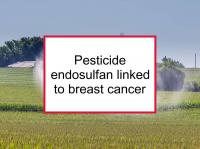While it is plausible that pesticides and herbicides, which are designed to kill living organisms, could also be harmful to human beings, the evidence for a link to cancer is not strong. Generally speaking, pesticide residues on fruits and vegetables grown in the U.S have not been convincingly linked to risk of breast cancer.
However, the limited research available does not take into account the cumulative effect of exposure from multiple sources over time. Farm workers and those living near farms do have a higher risk of breast cancer than the general population, indicating that there is a level of exposure at which risk is increased. This risk appears to be derived from the endocrine disrupting properties of some currently approved pesticides, i.e., compounds in certain pesticides interfere with hormone systems in the body. Now a new study has reported endosulfan, a pesticide only recently banned in the U.S., promotes the viability of hormone receptor positive (ER+/PR+) breast cancer cells.
When to buy organic foods
Organic foods are relatively expensive and not always available. There is some evidence that organic fruits and vegetables have better nutrient content than conventionally grown produce, however this is not always the case. Choosing beautifully ripened produce that has the appropriate color, texture and odor can be as important as the “organic” label with respect to nutrient content. However, the fruits and vegetables listed below are normally grown with relatively high levels of pesticides and/or other potentially harmful compounds and should be purchased organic, if possible.
Food produced in Mexico, Chile, and most other non-Western countries should only be purchased if organic. This is because regulations and standard practices can be dramatically less protective of consumers in other countries and we as consumers have no ability to evaluate the food production standards in force. For example, farmed shellfish usually incorporate much higher levels of natural and man-made toxic substances (antibiotics, pesticides, and persistent organic pollutants) than wild caught species. Captive shrimp are very susceptible to viral and bacterial infection, and farmers use antibiotics and pesticides to deal with this problem.
Top non-U.S. producers normally use chemicals banned in the U.S. In addition, industrial pollution residues in soils (found routinely in farmlands in India, China and elsewhere) can result in uptake of heavy metals by plants, as well as other types of endocrine disrupters and outright carcinogens. However, note that U.S. rules tend to be less protective of consumers than Western European regulations.
Herbs and spices should be organic, if possible. Pesticide use can be heavy in production of such products. Adulteration of herbs and spices is also prevalent throughout the world. For example, Hungarian paprika has been found to be mixed with brick dust. Lead is another favorite admixture because of its weight. Whole spices are less likely to be deliberately contaminated that powdered spices. Aflatoxin contamination is also common, even in spices produced in the U.S. Coffee and tea are also often grown using remarkably high levels of pesticides, herbicides, and fungicides.
U.S. animals that are used to produce meat, eggs and dairy products are normally raised using hormones and other growth promoters, antibiotics, and pesticides. These chemicals typically cannot be washed off, nor does soaking or cooking the foods necessarily improve their profiles. Buying organic or grass fed only partially addresses these problems.
Latest research: Endosulfan affects multiple epigenetic regulators
The study referenced above was designed to investigate how endosulfan affects epigenetic enzymes in hormone receptor positive (ER+/PR+) MCF-7 breast cancer cells. Epigenetic changes are potentially reversible modifications in gene expression that can be induced by dietary and environmental factors. Cumulative genetic and epigenetic alterations can transform normal breast cells into precancerous cells and finally into cancer cells. Endosulfan, a relatively inexpensive and effective pesticide related to DDT, has only recently been phased out in the U.S. (during the period 2010 to 2016) and residues are widely present in soil and groundwater. Despite its well-established endocrine, neuro- and reproductive toxicity, endosulfan is still used extensively in many countries.
To conduct the study, the authors treated MCF-7 breast cancer cells with either (1) dimethyl sulfoxide (DMSO), which was used as the control; or (2) α-endosulfan ("endosulfan") at concentrations of 1 and 10 μM. The authors then assessed the expression of various epigenetic enzymes. Endosulfan, at both concentrations, was found to significantly promote the viability of the breast cancer cells over a 24 hour period, a result that was accompanied by multiple epigenetic changes. Treatment with endosulfan resulted in overexpression of estrogen receptor alpha (ERα), which suggests that endosulfan has estrogenic properties.
The authors conclude that endosulfan modulates multiple cellular epigenetic regulators that are known to possess oncogenic potential.
